When trail-blazing editor John W. Campbell of Astounding Science Fiction (eventually renamed Analog Science Fiction and Fact) boldly declared that mystery and science fiction genres were incompatible, Isaac Asimov disagreed. In response, Asimov wrote The Caves of Steel, successfully creating a futuristic whodunit and proving Campbell wrong. Today, it seems like a passé point that science fiction can be injected into any literary genre, but it took Asimov’s mid-twentieth century vision to help pave the way. Here are eight notable science fiction detective mashups for those who need a futuristic crime fix.
The Caves of Steel (novel, 1954) by Isaac Asimov
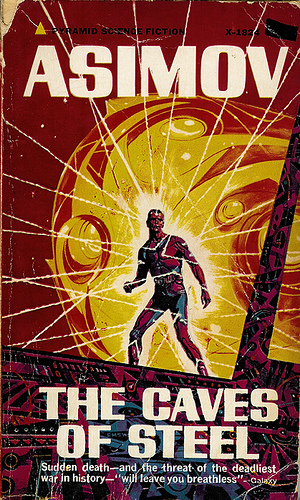 Elijah Baley is a New York City homicide detective living a few millennia into the future. He’s teamed with robot R. Daneel Olivaw to solve the murder of Daneel’s creator Dr. Sarton. Daneel is a first of his kind android that looks and acts human but whose knowledge of Earth is limited. Daneel admits, “I have been hurried into my role prematurely as a result of the murder.” Elijah, due to his bias against machines, immediately suspects his partner and attempts to implicate him on several different occasions. Complicating matters, the commissioner asks Elijah to provide accommodations for Daneel in Elijah’s apartment that he shares with his wife Jessie and their son Bentley. Elijah’s not sure how to explain his mechanical partner so he conceals the robot’s identity from his family since they are just as intolerant as he is toward machines. His wife, however, quickly discovers the truth and demands that he resign from the case. The reader will come to the conclusion long before Elijah that he and Daneel, given their diverse styles, meld very well—like a futuristic Holmes and Watson, following clues that lead to numerous suspects among both the humans and robots.
Elijah Baley is a New York City homicide detective living a few millennia into the future. He’s teamed with robot R. Daneel Olivaw to solve the murder of Daneel’s creator Dr. Sarton. Daneel is a first of his kind android that looks and acts human but whose knowledge of Earth is limited. Daneel admits, “I have been hurried into my role prematurely as a result of the murder.” Elijah, due to his bias against machines, immediately suspects his partner and attempts to implicate him on several different occasions. Complicating matters, the commissioner asks Elijah to provide accommodations for Daneel in Elijah’s apartment that he shares with his wife Jessie and their son Bentley. Elijah’s not sure how to explain his mechanical partner so he conceals the robot’s identity from his family since they are just as intolerant as he is toward machines. His wife, however, quickly discovers the truth and demands that he resign from the case. The reader will come to the conclusion long before Elijah that he and Daneel, given their diverse styles, meld very well—like a futuristic Holmes and Watson, following clues that lead to numerous suspects among both the humans and robots.
This novel was first serialized in Galaxy Magazine in 1953 with the hardcover edition following in 1954. Both characters went on to appear in several more Asimov novels including Naked Sun, The Robots of Dawn, and Robots and Empire. After winning a Retro Hugo award in 2004 and now sixty years later from its original release, The Caves of Steel proves to be a deserving classic.
Do Androids Dream of Electric Sheep? (novel, 1968) By Philip K. Dick
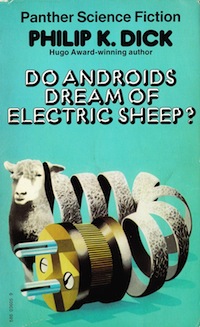 In the future (some recent editions have changed the setting from 1992 to 2021), World War Terminus has radically shifted the Earth’s population, and moving to a Mars colony is strongly encouraged by offering incentives like humanoid personal robots to individuals who abandon Earth. Those remaining on the plague-riddled home planet have predominantly relocated to the city’s decaying structures where they huddle together in bands. Animals have become expensive status symbols and many people like Rick Deckard and his wife own cheaper knock-off robotic animals that look like the real thing in hope of keeping up appearances. In this apocalyptic world (only one generation from now), many advanced androids have developed free will and have escaped their harsh imprisonment.
In the future (some recent editions have changed the setting from 1992 to 2021), World War Terminus has radically shifted the Earth’s population, and moving to a Mars colony is strongly encouraged by offering incentives like humanoid personal robots to individuals who abandon Earth. Those remaining on the plague-riddled home planet have predominantly relocated to the city’s decaying structures where they huddle together in bands. Animals have become expensive status symbols and many people like Rick Deckard and his wife own cheaper knock-off robotic animals that look like the real thing in hope of keeping up appearances. In this apocalyptic world (only one generation from now), many advanced androids have developed free will and have escaped their harsh imprisonment.
That’s where Deckard comes in, working for the police department tracking down androids—nicknamed andys—for a thousand dollars apiece. The latest Nexus-6 android type is particularly hard to distinguish from a human and “had from a sort of rough, pragmatic, no-nonsense standpoint evolved beyond a major—but inferior—segment of mankind.” [p.33] A co-worker of Deckard’s has been seriously wounded by a Nexus-6 and Deckard takes over the case using a Voigt-Kampff Altered Scale test that determines whether someone is human or andy. Deckard requests the Rosen Corporation that designed the Nexus-6 to provide an android group and a control group to make sure his polygraph-style equipment is workable. Rachel, a member of the company, is his first guinea pig. He immediately identifies her as an android though the corporation tells him she’s actually a human who lacks normal human empathy because she’s been raised on a spaceship with limited human interaction. Though Deckard is right, the company wants to discredit his test. Deckard eventually works through the maze of lies in his hunt for the rogue machines.
Today, PKD’s thought-provoking theme of what is self-will becomes even more intriguing as we move closer and closer to the rise of the inevitable positronic brains.
Note: PKD’s hugely influential novel has inspired three sequels written by hisfriend and fellow science fiction author K. W. Jeter.
“Death by Ecstasy” (short story, 1969) by Larry Niven
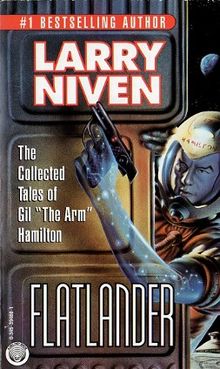 Gil Hamilton works for ARM whose three basic missions are to hunt organ-leggers (individuals that trade human organs on the black market), monitor world technology, and enforce fertility laws. In this first outing, an old friend and co-worker named Owen Jennison, who once saved Gil’s life in a mining accident, has been found dead. It appears Jennison had become a droud—a device that transfers an electric current to the brain—addict. The droud had been altered, administering ten times the normal charge which slowly killed Owen over a month’s time. When Jennison’s death is called a suicide, Gil begins his own investigation because he knows Owen wouldn’t have killed himself. Having psi powers coupled with telekinesis, Gil is able to use his phantom limb to hold a weapon and reach through walls.
Gil Hamilton works for ARM whose three basic missions are to hunt organ-leggers (individuals that trade human organs on the black market), monitor world technology, and enforce fertility laws. In this first outing, an old friend and co-worker named Owen Jennison, who once saved Gil’s life in a mining accident, has been found dead. It appears Jennison had become a droud—a device that transfers an electric current to the brain—addict. The droud had been altered, administering ten times the normal charge which slowly killed Owen over a month’s time. When Jennison’s death is called a suicide, Gil begins his own investigation because he knows Owen wouldn’t have killed himself. Having psi powers coupled with telekinesis, Gil is able to use his phantom limb to hold a weapon and reach through walls.
“Death by Ecstasy” was followed by three other short stories and a novella, Patchwork Girl. All are collected in a handy 1995 omnibus, Flatlander, which includes an insightful afterword by Larry Niven who proposes that Poe’s “The Murders in the Rue Morgue” could be included on the detective science fiction shelf because “His murderous ape was more fiction than animal research.”
Blade Runner (film, 1982)
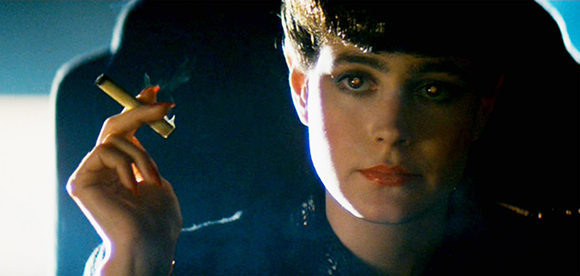
Though Ridley Scott’s third feature film Blade Runner, based on Philip K. Dick’s Do Androids Dream of Electric Sheep?, was initially a commercial disappointment, it’s now rightfully regarded as a sci-fi classic. The film deviates from PKD’s original storyline (as do most adaptations of the author’s work) but stays faithful to Dick’s overall vision of a dark future where replicants (changed from andy’s in the original) have escaped from the “off world” and returned to Earth. Rutger Hauer as Roy Batty—the most advanced of the replicants—steals the show, especially with the memorable, “I’ve seen things you people wouldn’t believe. Attack ships on fire off the shoulder of Orion. I watched C-beams glitter in the dark near the Tannhauser gate. All those moments will be lost in time… like tears in rain… Time to die.”
Philip K. Dick saw roughly the opening 20 minutes of footage prior to his death and has been quoted by Paul Sammon (the author of Future Noir: The Making of Blade Runner) as saying, “It was my own interior world. They caught it perfectly.” In 2007, after years of substandard and poorly edited films, Warner Bros. released a digitally re-mastered The Final Cutin time for the movie’s 25th anniversary.
Trivia: According to IMDb, in 1969, Martin Scorsese (Raging Bull, Taxi Driver, Goodfellas) and Jay Cocks (writer of Gangs of New York, The Age of Innocence) met PKD to discuss the possibility of adapting his novel into a film, but the project fell through. Interesting to imagine Scorsese’s favorite Robert “You talkin’ to me ?” DeNiro as the blade runner.
Dirk Gently’s Holistic Detective Agency (novel, 1987) by Douglas Adams
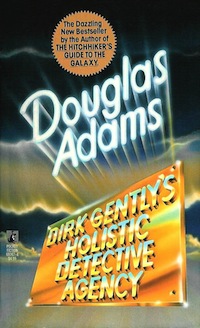 Douglas Adams described the Holistic Detective Agency as a “thumping good detective-ghost-horror-who dunnit-time travel-romantic-musical-comedy-epic” and he may have left out a few other descriptive sub-genres in this riotously entertaining modern classic by the talent who brought us The Hitchhiker’s Guide to the Galaxy.
Douglas Adams described the Holistic Detective Agency as a “thumping good detective-ghost-horror-who dunnit-time travel-romantic-musical-comedy-epic” and he may have left out a few other descriptive sub-genres in this riotously entertaining modern classic by the talent who brought us The Hitchhiker’s Guide to the Galaxy.
The story begins in a very fragmented approach, with several seemingly unrelated plot lines converging. Many billions of years ago the Salaxalans attempted to populate the Earth but instead their ship crashes killing all of them, but, thankfully for us, initiating the spark of life on Earth. The spirit of the engineer who screwed up the mission now wanders the planet hoping to undo his unfortunate mistake. He eventually influences Samuel Taylor Coleridge to compose “Kubla Khan” which will result in a domino effect and with a little help of a clandestine time machine keep the Salaxalan ship from being destroyed thus readjusting the engineer’s blunder. Whew! Yeah, the rich plot also throws in an electric monk, a woman looking for a date, a couch preposterously situated on a set of stairs that all comes together with the odd services of one Dirk Gently. Gently, who goes by a number of other names, is self-billed as a “holistic detective” who has a psychic gift, though he considers the skill as simply a “depressingly accurate knack for making wild assumptions.” Another madcap ride written by an author The Chicago Tribune summed up impeccably by saying, “Douglas Adams is the literary equivalent of ‘Monty Python,’ a writer whose prose shines a weird light on popular culture…”
Trivia: Dirk Gently’s Holistic Detective Agency has plot ingredients from two Doctor Whoepisodes starring Tom Baker: “Shada” (written by Adams) and “City of Death” (co-written by Adams with David Fisher and Graham Williams).
Minority Report (film, 2002)
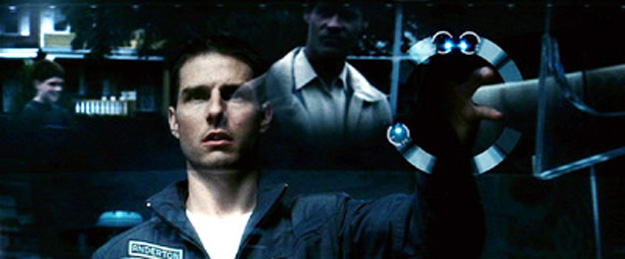
In 2054, Captain John Anderton (Tom Cruise) is chief of a Washington, D.C., pre-crime police force. His team relies on visions of the future seen by mutated humans (floating in a tank and hardwired to computers) with precognitive abilities to stop criminals before they commit crimes. Due to success of the radical program, the city has been murder free for six years. Since the system is about to be implemented nationwide, an audit is begun by Danny Witwer (Colin Farrell) from the United States Justice Department. The review discovers that Anderton will kill a man named Leo Crow in the next 36 hours. When a fellow police officer named Fletcher tells him he doesn’t have to run, Cruisedelivers the line, “Everybody runs, Fletch.”
While on the lam, his investigation reveals the three pre-cogs see different visions of the future. The system combines the two reports that agree and then dumps the minority report in deep storage within the conflicting pre-cog (usually the Agatha pre-cog who Anderton ends up taking with him on the run).
Director Spielberg described the film as “fifty percent character and fifty percent very complicated storytelling with layers and layers of murder mystery and plot.” Next to Blade Runner (I’ll even toss in the lighter original Total Recall), Minority Reportis the most satisfying to date adaptation of a Philip K. Dick novel.
Trivia: According to the invaluable IMDb, the “PreCogs” were named after the famous mystery writers Dashiell Hammett, Arthur Conan Doyle, and Agatha Christie.
I, Robot (film, 2004)
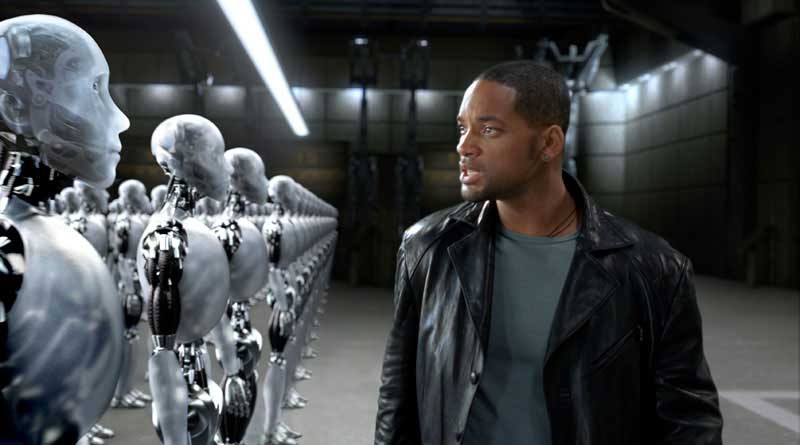
In 2035, robots are programmed with the Three Laws of Robotics directives: to never harm a human or let a human come to harm, to always obey humans unless this violates the First Law, and to protect its own existence unless this violates the First or Second Laws.
Will Smith plays Del Spooner, a Chicago police detective who has a deep prejudice against machines ever since a robot saved his life in a drowning car but let a twelve-year-old girl in another vehicle perish because the machine calculated that Smith had a better percentage of survival.
The main plot concerns Dr. Alfred Lanning (James Cromwell) co-founder of U.S. Robotics (USR) who dies of an apparent suicide after falling several stories. Spooner quickly establishes that Lanning was murdered but no one believes him and he’s ordered to drop the case. Spooner tells a scientist who ends up helping him, “Does thinking you’re the last sane man on the face of the Earth make you crazy? Because if it does maybe I am.” He begins following clues left behind by Lanning—in a kind of Hansel-&-Gretel-like crumbs storyline—leading to a possible “ghost in the machine” that might allow robots to naturally evolve. Spooner’s investigation reveals a robot named Sonny who asks the very uncharacteristic question, “Who am I?”
I, Robot is fairly straightforward with what one has come to expect from over-the-top summer blockbusters starring Smith, and though it bears little resemblance to Asimov except a general premise, it’s still a guilty pleasure.
The Automatic Detective (novel, 2008)
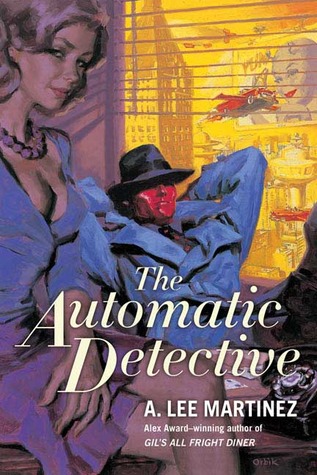 The Automatic Detective by A. Lee Martinez features the seven-hundred pound, seven-foot tall man made of metal, Mack Megaton. He was originally designed to destroy things, but he’s been reprogrammed (developing free will thanks in part to a glitch) and instead drives a cab in Empire City, trying to fit in with a “desire to be a productive member of society.” Mack’s slide into becoming an amateur detective occurs when he discovers the neighboring family is missing.
The Automatic Detective by A. Lee Martinez features the seven-hundred pound, seven-foot tall man made of metal, Mack Megaton. He was originally designed to destroy things, but he’s been reprogrammed (developing free will thanks in part to a glitch) and instead drives a cab in Empire City, trying to fit in with a “desire to be a productive member of society.” Mack’s slide into becoming an amateur detective occurs when he discovers the neighboring family is missing.
The Automatic Detective is a high energy juggernaut from start to finish and though you can point to references from other books and movies, it doesn’t detract. Mr. Martinez makes the characters fresh enough that you feel like this is the first time you’ve been down the ‘lone knight errant detective against the world’ road. You just know Mack, like Philip Marlowe and Spenser before him, will keep going until the job is done, the family is located, and wrongs are righted. Of course, not before he bumps into other colorful characters like the talking gorilla, sexy dames, and a green mob boss. What starts out as a search for the missing Bleakers spirals into bigger troubles that strike at the heart of Empire City. But not to fear, as Mack says when he begins his search through the darkened alleys, “I wasn’t built to back down.” Somewhere Sam Spade is smiling.
There are many more memorable science fiction mash-ups including China Miéville’s The City and The City, The Retrieval Artist novels by Kristine Kathryn Rusch, When Gravity Failsby George Alec Effinger, Hal Clement’s Needle, and Altered Carbonby Richard K. Morgan. I’d like to hear which book or film you would add to the list.
David Cranmer is the publisher of the BEAT to a PULP webzine and books and editor of the recent collections The Lizard’s Ardent Uniform and Other Stories and A Rip Through Time: The Dame, the Doctor, and the Device.










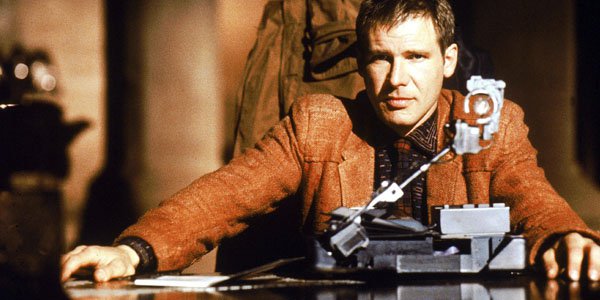
I always enjoyed the “Lord Darcy” stories by Randall Garrett. Set in an alternate time line (circa 1960’s and 70’s) where England and France are part of an empire ruled by the Plantagenet family, and where the laws of magic have been explored using the scientific method, Lord Darcy solves murder mysteries as the chief investigator for His Highness, the Duke of Normandy, aided by Master Sean O’Lochlainn (sp?) Forensic Sorcerer.
The Martian Crown Jewels by Poul Anderson
1. Ben Winters’ “The Last Policeman” trilogy. Fantastic.
2. Also, and not quite SF, William Hjortsberg’s “Falling Angel.”
Bimbos of the Death Sun is a very funny mystery about a murder at a con, with gamers, cosplayers, and authors both beloved and despised. Screamingly funny if you went to cons in the late 80’s.
Jeff S, I’ve always appreciated Garrett’s storytelling and see there’s an omnibus called Lord Darcy (1983) collecting all the stories.
Mord Fiddle, The Martian Crown Jewels by Poul Anderson. Duly noted. Thanks.
Dean B, I’ve heard many fine praises about Ben Winters’ “The Last Policeman” trilogy. Added to my TBR list.
wiredog, Bimbos of the Death Sun. Gotta love that title!
Jonathen Lethem’s “Gun, With Occasional Music” is a great example (although it’s generally considered “literary” fiction instead of “genre” fiction — but hey, psuedo-science drugs and talking kangaroos and artificially evolved grown-up babies? I think that counts as sci-fi).
@1: Jeff, I think he was going for SF, not fantasy. But I love the Lord Darcy stories! I only wish my copy wasn’t falling apart…
ThomDunn, Ha! Yes, I definitely think that counts as sci-fi. Thanks for the addition. And I never subscribed to “literary” vs. “genre.” A good story is a good story, right?
@5: dcranmer, I’d actually recommend the 2002 Lord Darcy omnibus since that will have every single story; the 1983 version doesn’t include 2 of the short stories.
@9: davidholden. Didn’t notice that updated collection. Appreciated.
Deranmer – I have the omnibus, but thanks for the tip.
Davidholden – I thought of that, but I would put Lord Darcy in the gray area between SF and fantasy. The systematization of the laws of magic, the limitations on them, and the internal consistensies, in the Garrett stories, put that magic in a wholly different catagory than “wingardium leviosa.”
If we add fantasy into the mix I would also include Death is a Lonely Business by Ray Bradbury where a young writer searches for a serial killer in Venice, California. Very noirish.
Check out Marooned in Realtime by Vernor Vinge. Bobble technology — a spherical time stasis field — is used to travel hundred of thousands of years into the future. It deals with both the mystery of the disappearance of most of the human race from the planet and a detective attempting to solve a locked room murder.
This also inspired the Hal Clement novel, Needle. As a crossover bonus, this is something of a YA novel. So it is a (very) hard-SF young-adult detective story.
Thankyou, KIA. Like that sharp-sounding plot.
ad, been years since I read Needle but it definitely is a must read of detective/sci-fi mash-up.
I was always hoping for another Blade Runner film by Ridley Scott. The sequels by Jeter are film worthy too.
I would agree with that, Mates. I thought Jeter did a solid job of connecting the dots between the film and Phillip K. Dick’s original.
What about Henghis Hapthorn, freelance discriminator of Old Earth? (from the Vancian Archonate stories by Matt Hughes)
How about Sawyer’s “The Terminal Experiment”? Very smooth blend of mystery and sci-fi.
SchuylerH, I haven’t read this series. But Hughes has been compared to Jack Vance so I know I can’t go wrong. Thanks for the tip.
MarkTroup, The list expands. Many thanks.
@20: Just imagine a far-future Sherlock Holmes who realises that the rational universe he knows and loves is about to be swept away.
If I’m allowed a second, there are also Jack McDevitt’s stories starring the antiquarian and amateur detective Alex Benedict.
Alfred Bester’s The Demolished Man, winner of the first Hugo Award in 1953, is quintessential.
I would recommend K.W. Jeter’s Noir as well. It has a femme fatale, cynical private detective, and general corruption you would expect from the genre.
No mention of The City and the City? Inconcievable.
Chabon’s Yiddish Policemans Union.
Bujold’s Memory and the “Weatherman” sections from The Vor Game.
All of Butcher’s Dresden Chronicles????
@24: yetanothergeek, I agree. Its included in my last paragraph.
Bimbos of the Death Sun. There is also “Zombies of the Gene Pool”
How about Warren Hammond’s Kop series: Kop, Ex-Kop and Kop Killer. Noir crime on another planet.
If you add fantasy to the titles, don’t forget Glen Cook’s series about the p.i. named Garrett, starting with Sweet Silver Blues. Recently George Kelley reviewed Robert J. Sawyer’s Red Planet Blues on his blog. It’s about a p.i. on Mars (all those p.i. guys have the blues).
If I may toot my own horn (toot!), my novel “No Time: The First Hour” is a time – travel mystery about a detective who has 48 hours to solve his own murder.
Well, more to add to my reading list. Thanks!
One of my film guilty pleasures is Strange Days. It deals with police corruption in the near future, and trying to unravel the death of a gangbanger. The sci-fi aspect is a memory-transfer device, that records people’s experiences for later review and possible sale; a hooker may have recorded the crime on her ‘squid’.
Another guilty pleasure is the ‘…in Death’ series by J. D. Robb, who usually writes romance novels as Nora Roberts. Her police procedurals in the near future are tightly written, with a strong spike of sexy cop.
No Leviathan Wakes?
I thought Empire State by Adam Christopher was pretty fun.
We easily created a top 50 list here. So many great titles, many of which I just added to my Kindle. Thank you, all.
Thought provoking stuff, Dave. I would second “The Yiddish Policeman’s Union”–it might stray a little into fantasty territory though, too.
Interestingly, John Campbell was the one who published the Lord Darcy stories in Analog. I guess he decided that SF and mysteries could coexist.
And a lot of the later Miles Vorkosigan books, where he was an Imperial Auditor, involved mysteries being unraveled.
@6, Gun, with Occasional Music is a little unusual too in that it isn’t just an SF novel that happens to include a bunch of goofy noir references— it actually bases its world-building on those references. We’ve all seen a clichéd cop snarling “I’ll ask the questions here”, so in this book the police are the only people who are allowed to ask any questions, ever; and due to a random joke from Raymond Chandler about someone looking like “a kangaroo in a dinner jacket”, Lethem created a world in which someone could literally be that.
I’ll toss in another book/movie combo: Harry Harrison’s Make Room!, Make Room!, filmed as Soylent Green. Both book and movie have the gritty, noir sense of life out of control with desperate (often failed) attempts to wrestle it back to a moral equilibrium.
Peter F. Hamilton’s Commonwealth Saga, the first two novels in particular. It’s a huge mystery and his detective, Paul Myo, was literally bred for the job.
Queen of Angels by Greg Bear— not a detective story exactly, but it’s got a mystery and police procedural angle.
You shouldn’t neglect the wonder that is “Pluto”, a manga by Urozawa Tezuka.
It does have its sequences of big robot destruction (its a manga after all), but the story rests on the shoulders of one of the most advanced robots in the world (and former super-soldier), working as a detective.
Oh and the case?
Somebody is destroying all the other advanced robots, one by one (they are a small club).
And it is brilliant – Phillip K. Dick would have been proud.
It appears Jennison had become a droud—a device that transfers an
electric current to the brain—addict. The droud had been altered,
administering ten times the normal charge which slowly killed Owen over a month’s time.
Nitpick here, but this is slightly inaccurate. The point of the story – and the really creepy bit – is that it wasn’t the charge that killed him; he starved to death, because getting up to get some food would have meant unplugging the droud, and he couldn’t bring himself to do that.
Sundiver by David Brin, which introduces the Uplift universe.
@44: a1ay, good nitpick. The exact cause of death was starvation. [Update: just noticed I signed in under my pen name and not David Cranmer for my last two comments. Don’t mean to be confusing. Too early in the morn. ;) ]
This is such a coincidence. In my reading of sf short stories currently, I have been looking for elements of detective fiction, which I have occasionally found in war and western. While I have seen all the three films, I haven’t read any of the novels you reviewed here. The Asimov and Philip K. Dick novels look really good and that’s where I’ll be heading next. Thanks for an entertaining piece, David.
Glad to help, Prashant! And after The Caves of Steel I would check out Naked Sun. A very strong continuation in the series.
Great post, David. Huge fan of PDK. I’ve never heard of that Adams book but I’m definitely going to look it up. For my money, he’s one of the funniest writers of all time.
Remains by Mark Tiedemann. Good both as SF and mystery.
@44: a1ay, that Edward A. Grainger was my answer under my pen name.
Definitely need more coffee!
@49: Chris, you will enjoy the Adams book especially if you appreciate his other better known work. Damn. He left us too soon.
@50: anewname, noted! Thanks.
I’d add EMISSARIES FROM THE DEAD by Adam-Troy Castro, the first “Andrea Cort” novel, about an investigation into murders committed in artificial ecosystem created by AIs and housing several sentient species including humans.
Kiln People by David Brin.
When Gravity Fails by George Alec Effinger. Middle Eastern cyberpunk PI. It’s fantastic.
I like Century Rain by Alastair Reynolds as an excellent SF/noir novel; Halfhead by Stuart McBride is near future crime with SF elements. For fantasy/crime tinged SF you can’t beat Ian McDonald’s River of Gods with it’s Krishna Cops…
And of course Douglas Adams wrote a Dirk Gently sequel, “The Long Dark Teatime of the Soul.”
2 Warps to Neptune above is correct–if you haven’t read Bester’s “The Demolished Man” you’re basically missing out on a seminal piece of science fiction and a good detective story. (Definitely a better use of your time than sitting through the movie “I, Robot”…if you want a second Asimov for the list, the collection from which the film takes its title includes the novella “Evidence.”)
I really wanted Mark Twain to make this list, but he just missed it: he wrote two novellas, “Tom Sawyer, Detective”, and “Tom Sawyer Abroad”, which is science fiction (Tom, Huck and Jim ride an atomic airship around the world).
I seem to be the only one I know who has read her, but really Rosel George Brown’s Sibyl Sue Blue books deserve note. Glorious 60s adventure romp concealing all sorts of intrigue and meaning.
Glad someone brought up The Demolished Man. Bester was awesome. I may have to reread that one, now that I am thinking of it.
And, while my memory is not giving me any specific examples, I think there were more mystery plots in Bester’s other work.
There’s also Lee Killough’s 3 novels starring future detectives Brill and Maxwell: The Dopplegänger Gambit, Spider Play and Dragon’s Teeth
What about Guy Haley’s Richards and Klein series – one of the pair is an AI! (Reality 36 and Omega Point are the two titles in the series so far.)
Lyda Morehouse’s Archangel Protocol, a cyberpunk noir detective story with angels.
Also, I remember an Edward Wellen robot detective story from many years ago called While-U-Wait…
Randy Johnson here
Read or seen(yes even Smith and Cruise) all but THE AUTOMATIC DETECTIVE.
@22:
Crikey, I’m glad someone in this thread brought up The Demolished Man. “Quintessential” is certainly the word for it.
Nice summing up… don’t leave out Asimov’s Wendell Urth, a Nero Wolfe – like detective who solves puzzles without leaving his office, by applying the laws of astrophysics or similar. He featured in several short stories.
‘Dining Out Around The Solar System’ is set in an alternate future London and Dublin, and contains crime aplenty, from a serial killer of runaways to pickpocketing, from drug dealers to hackers and assassins. The tale is also stuffed full of SF book references since the main characters are journalists and book reviewers. I also write contemporary crime stories so for me it was a natural combination. This is the first in a series and I’m about to release the second in the coming week.
‘Noughts And Crosses’ by Malorie Blackman also has has crime and terrorism, arising from a repressed underclass in an alternate Britain trying to gain civil rights.
I think we can agree that ‘ Use Of Weapons’ by Iain M Banks contains at least one murder, even if off-page.
‘Jackboot Britain’ by Daniel Fletcher is an alternate history in which the Nazis won WW2 – while I have not read it, the author added it to a Goodreads list of mine about SF and crime. I’d imagine there’s a good deal of scope for crime in that one.
Come to think of it, these are all British or Irish-written books, which may explain why they are not on your list.
Yiddish Policeman needs to be in there. You have the same story twice, once as a film and once as a book (and in my opinion the movie is better than the book).
I, Robot the movie?
Gak.
Would Jasper Ffords The Big Over Easy and The Fourth Bear fit in to this discussion?
+1 on ‘Jackboot Britain‘ and ‘Noughts and Crosses‘
I robot the movie should never be on the list for anything of any substance as the movie is an utter piece of trash that should be burned at the stake along with everyone who was involved. Dirk Gentley is also not really a detective story but a comedy. Phillip K Dick though works, and is the only one on here that stands up with Asimov. There is good sci/fi and there is bad….to much of this list is the bad.
“Jackboot Britain”
“Fatherland“